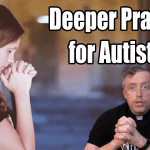
This week, Australian scientists made an interesting discovery in treating a tough medical condition. The hormone oxytocin has helped people who have trouble matching their body and their brain’s image of their body. Body Dysmorphic Disorder (BDD) is when people believe that part of their body is malformed or misshaped. This is distinct from Gender Dysphoria which gets a lot more media. In more severe cases, [edit: formally called body integrity dysphoria] these people feel so strongly that part of them should not be part that they ask for non-necessary amputations. “Trans-abled” is sometimes used for this more severe type. Oxytocin is a hormone which promotes love and bonding to others: bonding to one’s own body is new.
News Report
Treatment is difficult. But Australian researchers believe that Oxytocin, a hormone that facilitates trust and attachment (often called the love hormone) can bring relief. In an article published in Psychoneuroendocrinology, they reported that “oxytocin has neurobiological benefits and can be therapeutic for people with BDD.”
“Oxytocin is a powerful hormone produced in the brain which promotes positive behaviours,” co-author Izelle Labuschagne, of Australian Catholic University, says.
“People with BDD have significant social deficits including a bias in how they think others perceive their appearance, so it made sense for us to put the two together. Coming up with new treatments for BDD is important because there isn’t much out there that helps.”
Moral Analysis
On the surface, this is a positive breakthrough to be able to treat a psychophysical disorder with a simple human hormone. Oxytocin is not easy to overdose on: if these people had low levels, adding some would be helpful for overall health as it is naturally present in our body.
In recent years, there has been a discussion on how to deal with disorders where the mind and the body are discordant. Along with Body Dysmorphic Disorder, most of us have probably heard of anorexia nervosa and gender dysphoria. Many of these seem tough to treat. For example, “Anorexia nervosa carries a high risk of death, with a standardized mortality ratio of 11 to 12 times that expected, and a particularly high risk of suicide of 56 times that expected for age and sex.” The challenge with these conditions is determining if we should adjust the body to match the mind or the mind to accept the body. In anorexia, it seems obvious that we don’t let people starve themselves to death. It would be great news if a similar hormonal treatment could help those with anorexia.
Gender dysphoria is far more politically charged today. However, I think it would be a great step forward in treatment if something simple like this could resolve the suffering these people go through. We know that the natural hormones of puberty resolve the vast majority of childhood gender dysphoria cases so the person is not diagnosed as an adult. A textbook states, “A reliable estimate indicates that 80% to 95% of prepubertal children with [gender dysphoria] will no longer experience gender dysphoria in adolescence.” Also, as Ryan Anderson has pointed out in When Harry Became Sally and elsewhere, sex reassignment operations don’t seem to provide all the benefits touted and they have large side effects. Anderson states: “When it comes to the best studies, there is no evidence of ‘clinically significant changes’ after sex reassignment.” He continued, “In a discussion of the largest and most robust study… the Obama Centers for Medicare and Medicaid pointed out the nineteen-times-greater likelihood for death by suicide, and a host of other poor outcomes.” Then he concluded, “These results are tragic. And they directly contradict the most popular media narratives.”
Let’s encourage similar hormonal treatments that help people accept the body they have, whatever the diagnosis.
Note: I rely on monthly donations via Patreon for my writing. Please consider sponsoring me on Patreon.












